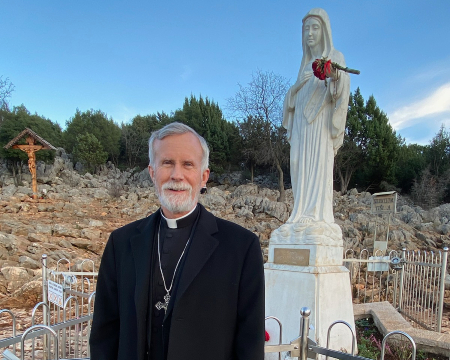Marcus Aurelius Maxentius
FREE Catholic Classes
Roman Emperor 306-12, son of the Emperor Maximinianus Herculius and son-in-law of the chief Emperor Galerius. After his father's abdication he lived in Rome as a private citizen; but when Galerius established in Rome and Italy the new poll and land taxes decreed by Diocletian he was elected (28 October, 306) rival emperor. Maxentius owed his elevation not to personal merit but to the senators and pretorians who, because of the unusual measures of the emperor, feared lest they should lose their privileged position. Maxentius's adherents then summoned his father from Campania to Rome ; and the young ruler invested him with the purple as co-regent. Thus the Roman empire had six rulers. Severus, the Augustus of the West, received a commission from Galerius to expel the youthful usurper from Rome ; but when he reached the capital, part of his army deserted to their old commander, Maximian. Severus with a few followers escaped to Ravenna so as to maintain military relations with Galerius. He then made terms with Maximian and surrendered to him, expecting honourable treatment, but he was imprisoned soon afterwards and, Galerius approaching from Illyria with an army, he was forced to commit suicide. Alarmed at Galerius's intervention, Maximian on behalf of Maxentius, negotiated with Constantine to whom he gave his daughter Fausta as bride. Meanwhile Galerius with his Illyrian legions pushed forward to the neighbourhood of Rome, but finding that he was unable to occupy it or any of the fortified places, he withdrew his forces. At his suggestion a conference of all the Cæsars took place at Carnuntum on the Danube (306) in which the prestige of Diocletian had great influence. Maxentius retained his imperial dignity. Though it is true that soon after this he put an end to the persecution of the Christians in Italy and Africa, his reign was stained with acts of debauchery and cruelty.
We ask you, humbly: don't scroll away.
Hi readers, it seems you use Catholic Online a lot; that's great! It's a little awkward to ask, but we need your help. If you have already donated, we sincerely thank you. We're not salespeople, but we depend on donations averaging $14.76 and fewer than 1% of readers give. If you donate just $5.00, the price of your coffee, Catholic Online School could keep thriving. Thank you.Help Now >
After his father's death, Maxentius and Maximin, Emperor of the East, fearing the political alliance of Constantine and Licinius, came to an understanding unfriendly to Constantine. Maxentius made extensive military preparations, and destroyed the statues and paintings of Constantine. Constantine advanced over what is now Mont Cenis with a comparatively small but well-drilled army and, victorious in several battles, occupied Upper Italy ; he then marched against Rome, where his opponent, strongly entrenched behind the Tiber and the walls of Aurelius, hoped to resist him successfully. Thoughtlessly and shortsightedly, Maxentius, abandoning this excellent position, made a bridge of boats across the Tiber (near the Milvian Bridge, now Ponte Molle), and awaited the troops of Constantine on the right bank of the river. It was then that occurred the miracle related by Eusebius (Vita Constant. I, 28-30), that when Constantine implored supernatural aid, a fiery cross appeared over the sun with the legend: to&úto níka (conquer with this). Further, he had been advised by Christ, in a dream the previous night, to go into battle armed with this sign. Maxentius's soldiers were thrown into confusion by the impetuosity of the Gallic horsemen, and in the efforts of the retreating masses to escape over the narrow bridge, many were thrown into the river and drowned, among them Maxentius (28 October, 312). His son and counsellors were put to death, but his officials and dependents retained their positions.
We ask you, humbly: don't scroll away.
Hi readers, it seems you use Catholic Online a lot; that's great! It's a little awkward to ask, but we need your help. If you have already donated, we sincerely thank you. We're not salespeople, but we depend on donations averaging $14.76 and fewer than 1% of readers give. If you donate just $5.00, the price of your coffee, Catholic Online School could keep thriving. Thank you.Help Now >







 Daily Readings for Saturday, April 20, 2024
Daily Readings for Saturday, April 20, 2024 St. Marian: Saint of the Day for Saturday, April 20, 2024
St. Marian: Saint of the Day for Saturday, April 20, 2024 Children's Prayer For Parents: Prayer of the Day for Saturday, April 20, 2024
Children's Prayer For Parents: Prayer of the Day for Saturday, April 20, 2024


